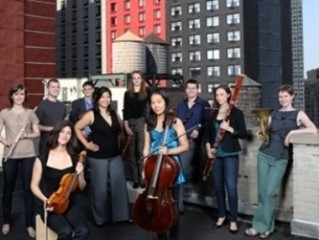|
Back
The Bittersweet Aroma of Memories New York
SubCulture
06/11/2014 -
“Farewells”:
Thomas Bergeron: Reflections (World Premiere)
Gustav Mahler: Das Lied von der Erde (Arranged for chamber orchestra by Arnold Schoenberg, completed by Rainer Riehn)
Timothy Fallon (Tenor), Margaret Mezzacappa (Mezzo-soprano)
Ensemble ACJW: Jesse Han (Flute), Stuart Breczinski (Oboe), Liam Burke (Clarinet), Nanci Belmont (Bassoon), Laura Weiner (Horn), Thomas Bergeron (Trumpet, flugelhorn), Ian Sullivan, Nick Taylor (Percussion), Alexandria Le (Harmonium), Tyler Wottrich (Piano), Michelle Ross, Clara Lyon (Violins), Megan Griffin, John Stulz (Violas), Hannah Collins, Alice Yoo (Cellos), Tony Flynt (Bass), Tito Munoz (Conductor)

Ensemble ACJW (©Courtesy of the Artists)
“Bittersweet” was the description which ACJW gave itself after two years of concerts at SubCulture. While the music itself was more sweet than bitter, both works were nostalgic, reflective, both reached into a strange psyche of the full-house audience, and both Thomas Bergeron’s Reflections and the chamber version of Mahler’s Song of the Earth were perhaps calculated to immerse memories as much as music.
ACJW itself is made of young professional performers who oft make their home at Carnegie Hall, and perform eclectic music with an emphasis on the challengingly contemporary. But their two works last night, while anything but mawkish, did offer a kind of nostalgic time trip.
The first was a world premiere by the ACJW’s own trumpet player, Thomas Bergeron. “We do a lot of reflecting, even reflecting upon reflections,” he said of Reflections. And this ten-minute work, written for trumpet (Mr. Bergeron), marimba (Ian Sullivan) and cello (Hannah Collins) did create a reflection to another time. Perhaps the time of the 1960’s, the time of Gerry Mulligan and cool jazz and hints of Latin rhythms. In fact, the work started with a cool five-note motive on marimba, a lulling addition by cello, and then Mr. Bergeron, playing some fairly nifty riffs on trumpet and flugelhorn.
Now I’ve never been a fan of cool jazz, the stuff of MJQ and their acolytes. If jazz doesn’t go somewhere, if it isn’t pushed to the limit, then it becomes sophisticated, almost academic elevator music. But these three artists, didn’t need to go anywhere, theirs was a music which took one back a few decades, which created a three-way jigsaw puzzle which aligned, grew apart, coalesced again, and gave a pattern of poise with a Brazilian touch.
The beauty of the work was not its original inspiration but its sense of quiet delight. Perhaps the delight of working with ACJW itself for Mr. Bergeron.
Which brings up that most controversial work, Gustav Mahler’s gigantic “symphony with words,” based on Teutonically bombastic translation of Chinese Sung Dynasty poems. Bombastic for Chinese poetry, but ideal for Mr. Mahler.
It was written for two singers and a Mahler-sized orchestra. But Schoenberg obviously enjoyed acting as Bach, taking music of others giving his own “cover” versions. He did that with Johann Strauss, Brahms, and here, taking that orchestra down to strings, piano, harmonium, percussion and some solo winds and brass, along with the singers.
Part of if works brilliantly, since Mahler used passages of solo flute, oboe and horn. On the other hand, one misses the fanfares from “Of beauty”, the long string dirges from “Farewell”, and the great orchestral climaxes.
The music is deficient in “The Solitary One in Autumn”, where the mezzo in the original invokes “sun of love” over a glowing crescendo in the strings. With this chamber string group, the temperature is tepid. Yet in the folk-like “Of Youth”, Mahler’s bucolic rural music fits just right with this group.
In other words, one must accustom oneself to a very different Mahler. When I heard it before in Alice Tully Hall, it was a novelty, almost quaint. Not quite small enough for one to imagine Chinese ink drawings for the songs, but hardly large enough to even hint at the gargantuan conception.
Here in SubCulture, we had an extra dimension. SubCulture itself is a communal place, where everything quite close to the stage. So here, one had, beside the music, these young musicians led by Tito Muńoz, up close and natural. Each of those nuances was reflected in the faces of the musicians, the sudden birdcalls or oboe descants or solo violin arias was augmented by the faces and moods of the performer. Outside of the music, one felt like a welcome guest into a room where some talented musicians were having a good time.
Adding to that illusion was that this was not a perfect performance by any means. A few fluffs from the horn, a bit of ragged ensemble playing, and an unavoidable feeling that, where Mahler transcended time, Schoenberg was working in a musty Germanic studio.
The two soloists were well aware of SubCulture’s spaces, and they never tried to sing at full volume. Tenor Timothy Fallan had a sweet and sometimes sweeping voice, while Margaret Mezzacappa obviously could have used her full powerful range. Instead, she restrained herself. And in “Farewell”, that finale where every measure, every phrase seems to have a different rhythm, a different meter, Ms. Mezzacappa retained that one lyrical melody, ending with the words which ACJW might have hoped for themselves in this bittersweet concert: “Always...always...”
Harry Rolnick
|